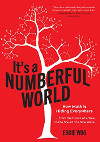- About MAA
- Membership
- MAA Publications
- Periodicals
- Blogs
- MAA Book Series
- MAA Press (an imprint of the AMS)
- MAA Notes
- MAA Reviews
- Mathematical Communication
- Information for Libraries
- Author Resources
- Advertise with MAA
- Meetings
- Competitions
- Programs
- Communities
- MAA Sections
- SIGMAA
- MAA Connect
- Students
- MAA Awards
- Awards Booklets
- Writing Awards
- Teaching Awards
- Service Awards
- Research Awards
- Lecture Awards
- Putnam Competition Individual and Team Winners
- D. E. Shaw Group AMC 8 Awards & Certificates
- Maryam Mirzakhani AMC 10 A Awards & Certificates
- Two Sigma AMC 10 B Awards & Certificates
- Jane Street AMC 12 A Awards & Certificates
- Akamai AMC 12 B Awards & Certificates
- High School Teachers
- News
You are here
It's a Numberful World

Publisher:
The Experiment
Publication Date:
2019
Number of Pages:
336
Format:
Paperback
Price:
16.95
ISBN:
9781615196128
Category:
General
[Reviewed by , on ]
Hannah Robbins
06/17/2019
A quick perusal of It’s a Numberful World’s table of contents shows many of the expected topics for a recreational math book, such as the Fibonacci numbers, cryptography, and knot theory. However, it is clear from the first page that this book has a highly unique style and tone. Eddie Woo keeps his writing extremely conversational and allows his sections to feel like a series of engaging stories rather than taking a more traditional textbook tone and format. It’s a Numberful World mingles text, pictures, fonts, and other graphic approaches to typesetting to create an engaging look. This approach may not be a good fit for every situation, but where its style is appropriate it is uniquely well suited among books on similar topics.
Woo has clearly designed this book to render irrelevant any barriers based on his readers’ lack of mathematical confidence. The first section is an extended argument that since mathematics is at its heart a search for patterns, all human brains are designed to do math. Throughout the book, he introduces mathematical vocabulary in a fun and approachable way, often with explanations of the origins behind unfamiliar words. Mathematical topics are framed with stories from Woo’s own life as well as tied to historical figures or non-mathematical ideas and situations.
For the most part, the chapters can be read in any order, with any connections between chapters being conspicuously pointed out. Each topic is explored using clearly illustrated examples, many of which include places where the reader is asked to stop and think about things before reading further. There are no exercises, although each topic’s coverage is short enough that plenty of supplemental questions could be created to ask or assign. The range of topics is broad enough to appeal to people with a variety of backgrounds, although some of the chapter titles are vague enough that it isn’t immediately obvious what the main mathematical idea is.
I think this book would be most appropriate as either a recreational read or the starting point for a mathematical discussion. It could easily be used as a textbook for an introductory mathematics seminar or an independent study general math class, or simply be read by anyone who would enjoy a gentle but enthusiastic introduction to a wide variety of interesting mathematical topics.
Hannah Robbins is a professor at Roanoke College in southwestern Virginia.
The table of contents is not available.
- Log in to post comments




